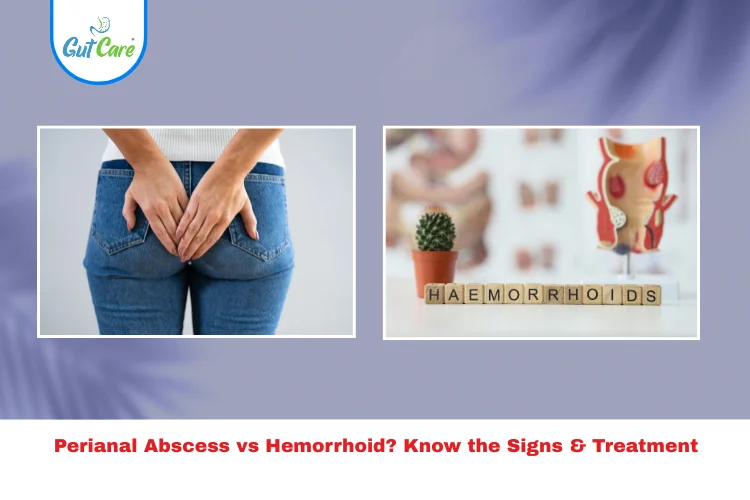Perianal Abscess vs Hemorrhoid—what’s the difference, and how can you tell which condition you might have? Both cause discomfort around the anal area but have distinct causes, symptoms, and treatment approaches. In this comprehensive guide by Gutcare Clinics, a leading colorectal care center in Bangalore, we break down the perianal abscess vs hemorrhoids symptoms, their treatments, types, and the importance of timely medical attention. Keep reading to understand how to identify and manage these common yet painful anorectal conditions.
What is a Perianal Abscess?
A perianal abscess is a pus-filled infection located near the anus. It falls under the broader category of anorectal abscesses, which also include perirectal abscesses and perineal abscesses. This condition occurs when a small anal gland becomes infected and forms an abscess.
Perianal Abscess Meaning
The term simply refers to an infection or collection of pus near the anus. It is a painful condition and should not be ignored.
Perianal Abscess Causes
The primary causes include:
- Blocked anal glands
- Inflammatory bowel disease (IBD)
- Sexually transmitted infections
- Trauma to the anal area
- Diabetes or weakened immunity
Perianal Abscess Symptoms
Common symptoms include:
- Sudden pain near the anus
- Swelling and redness
- Fever or chills
- Pus drainage
- Difficulty sitting or walking
If untreated, a perianal abscess may lead to a fistula, an abnormal connection between the anal canal and the skin.
Types of Perianal Abscess
There are different classifications of perianal abscess types, including:
- Perianal abscess – most common, superficial infection near the anus
- Ischiorectal abscess – deeper infection through the external sphincter
- Intersphincteric abscess – located between the internal and external sphincters
- Supralevator abscess – rare, but serious and located above the pelvic floor
These fall under the umbrella of anorectal abscess types, which vary based on location and severity.
Perianal Abscess Treatment
Treatment usually involves:
- Surgical drainage under local or general anesthesia
- Antibiotics (in select cases)
- Follow-up care to monitor for complications
For complex cases like a perineal abscess (male/female) or deep-seated infections, timely intervention at a specialized center like Gutcare Clinics, Bangalore, is critical.
Hemorrhoids Explained
Hemorrhoids, also known as piles, are swollen veins in the lower rectum or anus. Unlike abscesses, hemorrhoids are not caused by infection but rather by increased pressure in the veins of the anal area.
Hemorrhoids Symptoms
- Painless rectal bleeding
- Itching or irritation
- Swelling around the anus
- Pain during bowel movements (in external hemorrhoids)
- A lump near the anus (external hemorrhoid)
Hemorrhoids Treatment
Treatment options vary based on severity:
- Lifestyle changes: High-fiber diet, hydration
- Topical creams and suppositories
- Minimally invasive procedures like rubber band ligation
- Surgical removal (hemorrhoidectomy)
A proctologist can recommend the best course of treatment based on individual needs.
Perianal Abscess vs Hemorrhoid: Key Differences
| Feature | Perianal Abscess | Hemorrhoids |
| Cause | Infection of anal gland | Pressure in rectal veins |
| Symptoms | Severe pain, swelling, pus | Bleeding, itching, lump |
| Urgency | Requires urgent treatment | Often manageable conservatively |
| Treatment | Surgical drainage | Lifestyle changes, medication |
| Complications | Can lead to fistula | Thrombosis or prolapse |
Why Timely Diagnosis Matters
Both conditions affect the anal region but have different causes and require different treatments. Delaying care can lead to complications like fistulas (in abscesses) or thrombosed hemorrhoids.
At Gutcare Clinics, Bangalore, our expert team provides accurate diagnosis and individualized treatment for all anorectal disorders, ensuring faster recovery and lasting relief.
When to Consult a Piles Doctor
Consult a hemorrhoid specialist or colorectal surgeon if you experience:
- Persistent anal pain
- Pus discharge or swelling
- Rectal bleeding
- Fever with anal discomfort
Early intervention leads to better outcomes.
Summary:Perianal abscess vs Hemorrhoid
Understanding the difference between a perianal abscess vs hemorrhoid can help in seeking timely care. While both are painful conditions, their causes and treatments differ significantly. A perianal abscess is a serious infection needing drainage, while hemorrhoids often resolve with conservative measures.
If you are experiencing any symptoms, don’t wait—consult Gutcare Clinics in Bangalore, a trusted name in colorectal care, for expert evaluation and treatment.
FAQs About Perianal Abscess vs Hemorrhoid
1. What are the main signs and symptoms of a perianal abscess?
The symptoms of a perianal abscess consist of horrible anal pain, swelling, moisture (pus), and fever! It’s usually urgent to drain a perianal abscess promptly to avoid complications!
2. What are the significant differences between the symptoms of hemorrhoids and a perianal abscess?
Hemorrhoids symptoms are often characterized by painless bleeding, itching, and lumps around the anus while perianal abscess causes pain, fever, swelling with infection!
3. What common types of perianal abscesses are there?
Common perianal abscess types include conventional perianal abscess, ischiorectal abscess, intersphincteric abscess and supralevator abscess. Each type will require different management depending on complications (depth and location).
4. What is the best treatment course for a perianal abscess?
The most common treatment for a perianal abscess will require surgery to drain the abscess. Antibiotics may be used based on the case. After surgical care it is extremely important to avoid recurrent perianal abscess or fistula.
5. Why pick Gutcare Clinics for treatment of perianal abscess or hemorrhoids?
Gutcare Clinics located in Bangalore, India, provides cutting edge treatment options for perianal abscess, perineal abscess (male or female) and hemorrhoids. Our hemorrhoid specialists and colorectal surgeons have an excellent reputation in treating these cases and high outcomes of success!




